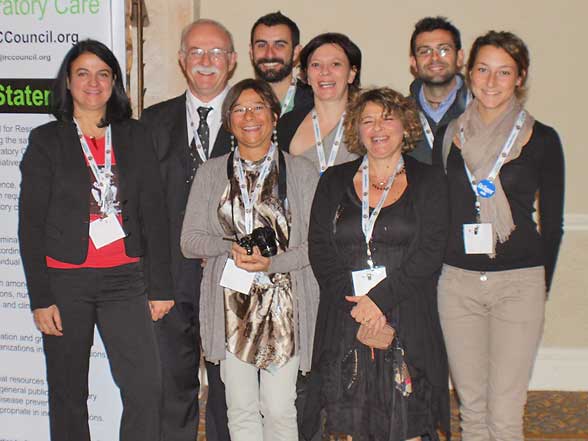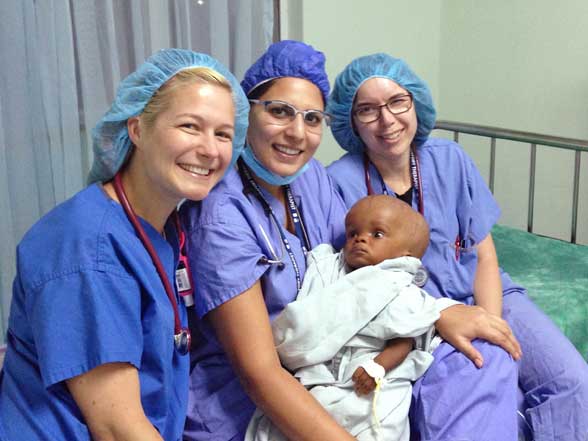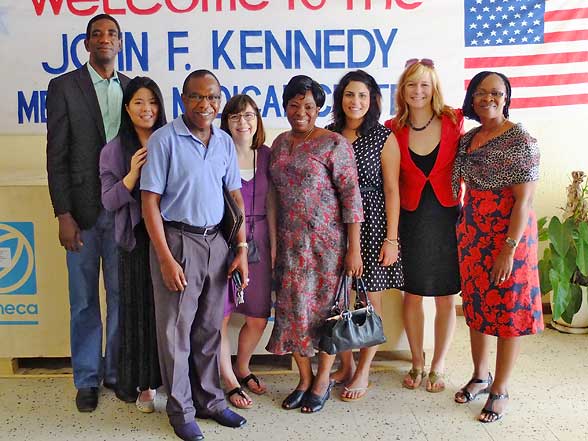Respiratory Care Related Developments in the United Kingdom
December 10, 2014
Italian Association for Respiratory Care – Associazione Riabilitatori dell’ Insufficienza Respiratoria (ARIR)
December 20, 2014Submitted By: Ingrid Hakanson, RRT, AA
In March of 2014, three Vancouver General Hospital respiratory therapists, Ingrid Hakanson, Natasha Mohan and Taryn Millway joined a medical mission to Liberia sponsored by the Korle-Bu Neuroscience Foundation. They were selected to join a team that included three neurosurgeons, five nurses, an anesthesiologist, a biomedical engineer, and an administrative assistant. Members of the team hailed from Canada, the US, and Nigeria. The goal of the mission was to deliver as many spine and brain surgeries as possible and teach supportive care techniques of neurological patients to the Liberian medical staff.This would be the first time since before the civil war that the people of Liberia would have access to these procedures. One hundred and fifty patients were assessed for surgery, some taking the treacherous seven-hour drive from Monrovia to see if they could be helped. Following assessment, eighteen of the patients received neurosurgery.
Ingrid Hakanson speaking on behalf of the Respiratory Therapists related: “It is difficult to verbalize the beautiful gifts that we took away from this trip. All I can say is that it has changed us forever. You leave a place where people are so positive and loving in the face of unbelievable challenges and suffering, and it makes you look at your privileged life in a new light. We are so spoiled in our jobs with all the tools, machines and numbers available to us. Being forced to work without them is amazing for developing creativity, problem-solving, and clinical skills”.

Canadian RT’s with young patient.
The three Respiratory Therapists functioned as Anesthesia Assistants in a makeshift recovery room, weaning post-operative patients from ventilators and delivering general respiratory care as needed. The RT’s ended up doing much more. They held education sessions on oxygen therapy and bag-mask ventilation with doctors and nurses, and set up a system for them to organize donated supplies in the OR. They organized code blue boxes, set up code blue carts, and ran mock codes. The RT team became known as “those respiratory girls that can do anything and never stop moving.” At the same time, the neurosurgery team instructed the RT’s about the surgeries being performed and about in-depth neurology assessments. The Liberian physicians educated the team on neonatal care and they learned from village women about women’s health in a third world country. The people in the village of Tappita taught the team about the resilience of the human spirit and the RT’s spent time in the community, educating the villagers about Ebola prevention and playing soccer with the local kids.
For the team members it was truly a staggering experience to work in an environment so different from North America. They had to make decisions that weighed the patient’s probability of survival with a good outcome against using valuable procedures and supplies. There was no ICU, no rehabilitation. The RT’s found cockroaches in the unused ventilators due to lack of resources and education on how to use them. However, the team learned that the Liberians were incredible professionals, not lacking in knowledge or enthusiasm. They grabbed on to every piece of information to given them with stars in their eyes, asking every question they could think of. The RT’s wished they had the time to teach them more.
Patients that would never have survived or were wheelchair-bound walked out of the hospital at the end of the mission, but they barely scratched the surface. Many more missions are needed before they will be ready to provide this level of care on their own. Focused training of Liberian surgeons in other countries that have neurosurgical residencies will be vital to their success, as will be instruction in comprehensive respiratory care modalities. Ingrid Hakanson, RRT, AA stated that she and her colleagues know that it will be a long road to success, but they realized that they had accomplished what they went there to do when President Ellen Johnson Sirleaf met the team personally and said, “You came to help our people with medical problems, but you also made them feel valued, and that sometimes means more.”



